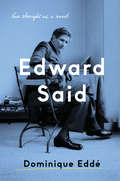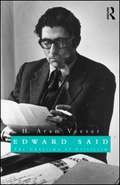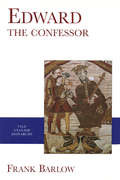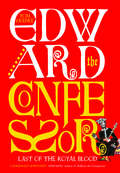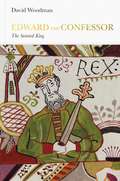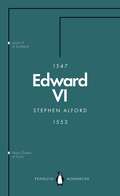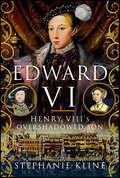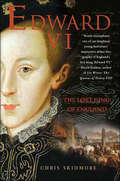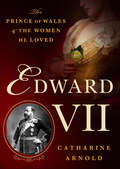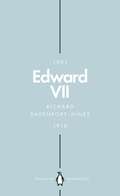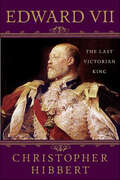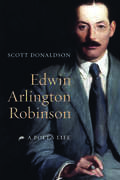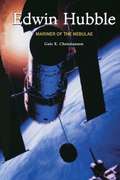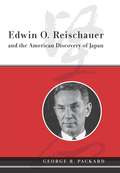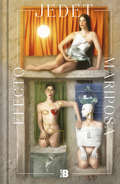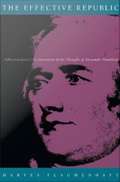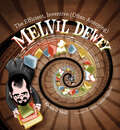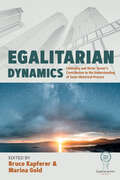- Table View
- List View
Edward Said: His Thought as a Novel
by Dominique EddeAn intimate account of Edward Saïd's life and thoughtEdward Said is a personal, literary portrait of one of the twentieth century’s most influential scholars, written by his close friend and confidante. Here, Lebanese novelist and essayist Dominique Eddé offers a fascinating and fresh presentation of his oeuvre from his earliest writings on Joseph Conrad to his most famous texts, Orientalism and Culture and Imperialism. Eddé weaves together accounts of the genesis and content of Said’s work, his intellectual development, and her own reflections and personal recollections of their friendship, which began in 1979 and lasted until Said’s death in 2003. In this intimate and searching portrait of Said’s thought, Eddé continues to maintain their dialogue despite his death, trying to make peace with the loss of a collaborator with whom she still wants to talk and disagree.Bringing together personal reflection and theoretical innovation, reflective mourning and immediate argument, Eddé has written a testament to a great intellectual passion.Both specialists of Said’s work and newcomers will find much to learn in this rich portrait of one of the twentieth century’s most important intellectuals.
Edward Said: The Charisma of Criticism
by H. Aram VeeserThe author brings about the actual man in Edward Said -- embedded in the politics of the Middle East but soaked in the values of the West and struggling to advance the best European ideas.
Edward the Caresser: The Playboy Prince Who Became Edward VII
by Stanley WeintraubA weak English King at a critical time.
Edward the Confessor
by Frank BarlowFrank Barlow's magisterial biography, first published in 1970 and now reissued with new material, rescues Edward the Confessor from contemporary myth and subsequent bogus scholarship. Disentangling verifiable fact from saintly legend, he vividly re-creates the final years of the Anglo-Danish monarchy and examines England before the Norman Conquest with deep insight and great historical understanding."Deploying all the resources of formidable scholarship, [Barlow] has recovered the real Edward." -- Spectator
Edward the Confessor: Last of the Royal Blood (The English Monarchs Series)
by Tom LicenceAn authoritative life of Edward the Confessor, the monarch whose death sparked the invasion of 1066 One of the last kings of Anglo-Saxon England, Edward the Confessor regained the throne for the House of Wessex and is the only English monarch to have been canonized. Often cast as a reluctant ruler, easily manipulated by his in-laws, he has been blamed for causing the invasion of 1066—the last successful conquest of England by a foreign power. Tom Licence navigates the contemporary webs of political deceit to present a strikingly different Edward. He was a compassionate man and conscientious ruler, whose reign marked an interval of peace and prosperity between periods of strife. More than any monarch before, he exploited the mystique of royalty to capture the hearts of his subjects. This compelling biography provides a much-needed reassessment of Edward&’s reign—calling into doubt the legitimacy of his successors and rewriting the ending of Anglo-Saxon England.
Edward the Confessor: The Sainted King (Penguin Monarchs)
by David WoodmanEdward the Confessor, the last great king of Anglo-Saxon England, canonized nearly 100 years after his death, is in part a figure of myths created in the late middle ages.In this revealing portrait of England's royal saint, David Woodman traces the course of Edward's twenty-four-year-long reign through the lens of contemporary sources, from the Anglo-Saxon Chronicle and the Vita Ædwardi Regis to the Bayeux Tapestry, to separate myth from history and uncover the complex politics of his life. He shows Edward to be a shrewd politician who, having endured a long period of exile from England in his youth, ascended the throne in 1042 and came to control a highly sophisticated and powerful administration.The twists and turns of Edward's reign are generally seen as a prelude to the Norman Conquest in 1066. Woodman explains clearly how events unfolded and personalities interacted but, unlike many, he shows a capable and impressive king at the centre of them.
Edward VI: The Last Boy King (Penguin Monarchs)
by Stephen AlfordEdward VI, the only son of Henry VIII, became king at the age of nine and died wholly unexpectedly at the age of fifteen. All around him loomed powerful men who hoped to use the child to further their own ends, but who were also playing a long game - assuming that Edward would long outlive them and become as commanding a figure as his father had been. Stephen Alford's wonderful book gives full play to the murky, sinister nature of Edward's reign, but is also a poignant account of a boy learning to rule, learning to enjoy his growing power and to come out of the shadows of the great aristocrats around him. England's last child monarch, Edward would have led his country in a quite different direction to the catastrophic one caused by his death.
Edward VI: Henry VIII's Overshadowed Son
by Stephanie KlineFor too long, King Edward VI has been pushed to the very edges of Tudor history - overlooked in favor of some of the more vibrant personalities of his family members, such as Henry VIII and Elizabeth I. Known as the 'boy king' of the Tudor dynasty, he is often remembered for little more than the ambitious councillors who governed England during his minority. His reign, however, and the significant religious changes that took place as he furthered the Protestant Reformation in England, had great influence over the remaining decades of the Tudor period and even modern Britain as we know it today. ‘Boy king’ though he may have been, Edward VI and his government were more significant to the history of England than he is often given credit for, and it is long past time for careful and thoughtful study of his life and reign. Edward VI: Henry VIII’s Overshadowed Son aims to reopen the pages of his story, arguing that however brief it may have been, Edward VI’s reign had lasting impacts on the religious landscape in England, and is certainly a Tudor reign worth remembering.
Edward VI: The Lost King of England
by Chris SkidmoreThe birth of Edward on October 12, 1537, ended his father's twenty-seven-year wait for an heir. Nine years later, Edward was on the throne, a boy-king in a court where manipulation, treachery, and plotting were rife.Henry VIII's death in January 1547 marked the end of a political giant whose reign had dominated his kingdom with an iron grip for thirty-eight years. Few could remember an England without him---certainly little had remained untouched: the monasteries and friaries had been ripped down, the Pope's authority discarded, and new authoritarian laws had been introduced that placed his subjects under constant fear of death.Edward came to the throne promising a new start; the harsh legislation of his father's was repealed and the country's social and economic problems approached with greater sensitivity. Yet the early hope and promise he offered soon turned sour. Despite the terms of Henry's will, real power had gone to just one man---the Protector, Edward's uncle, the Duke of Somerset, and there were violent struggles for power, headed by the duke's own brother, Thomas Seymour.Chris Skidmore reveals how the countrywide rebellions of 1549 were orchestrated by the plotters at court and were all connected to the burning issue of religion: Henry VIII had left England in a religious limbo. Court intrigue, deceit, and treason very nearly plunged the country into civil war. The stability that the Tudors had sought to achieve came close to being torn apart in the six years of Edward's reign.Even today, the two dominant figures of the Tudor period are held to be Henry VIII and Elizabeth I. Yet Edward's reign is equally important. His reign was one of dramatic change and tumult, yet many of the changes that were instigated during this period---certainly in terms of religious reformation---not only exceeded Henry's ambitions but have endured for over four centuries since Edward's death in 1553.
Edward VII: The Prince of Wales and the Women He Loved
by Catharine Arnold“Victorian England: We know what that was supposed to mean — all priggish prudery and "we-are-not-amused" harrumphing. Except now we know it wasn't all that . . . [Catharine Arnold’s] new biography focuses — deliciously — on the women who shared the scandalously plentiful sex life of Queen Victoria's eldest son, the Prince of Wales, later Edward VII.” —USA TodayEdward Prince of Wales, better known as “Bertie,” was the eldest son of Queen Victoria. Charming and dissolute, he was a larger-than-life personality with king-size appetites. A lifelong womanizer, Bertie conducted his countless liaisons against the glittering backdrop of London society, Europe, and the stately homes of England in the second half of the 19th century. Bertie’s lovers were beautiful, spirited, society women who embraced a wide field of occupations. There was Lillie Langtry, the simple Jersey girl who would become an actress and producer; “Daisy” Brooke, Countess of Warwick, the extravagant socialite who embraced socialism and stood for Parliament as a Labour party candidate; bisexual French actress Sarah Bernhardt, celebrated for her decadent appeal and opium habit; and by total contrast the starchy Agnes Keyser, who founded a hospital for army officers. One of Bertie’s most intriguing liaisons was with American heiress Jennie Churchill, unhappy wife of Sir Randolph Churchill and mother of Sir Winston. While the scandals resulting from his affairs—from suicides to divorces—were a blight on the royal family, Bertie would become a surprisingly modern monarch. His major accomplishment was transforming the British monarchy into the modern institution that we know today and ensuring its survival in a period when every other European dynasty collapsed in the wake of WWI.
Edward VII: The Cosmopolitan King (Penguin Monarchs)
by Richard Davenport-HinesLike his mother Queen Victoria, Edward VII defined an era. Both reflected the personalties of their central figures: hers grand, imperial and pretty stiff; his no less grand, but much more relaxed and enjoyable. This book conveys Edward's distinct personality and significant influences. To the despair of his parents, he rebelled as a young man, conducting many affairs and living a life of pleasure. But as king he made a distinct contribution to European diplomacy and - which is little known - to London, laying out the Mall and Admiralty Arch. Richard Davenport-Hines's book is as enjoyable as its subject and the age he made.
Edward VII: The Last Victorian King
by Christopher HibbertA riveting biography that vividly captures the life and times of the last Victorian king.To his mother, Queen Victoria, he was "poor Bertie," to his wife he was "my dear little man," while the President of France called him "a great English king," and the German Kaiser condemned him as "an old peacock." King Edward VII was all these things and more, as Hibbert reveals in this captivating biography. Shedding new light on the scandals that peppered his life, Hibbert reveals Edward's dismal early years under Victoria's iron rule, his terror of boredom that led to a lively social life at home and abroad, and his eventual ascent to the throne at age 59. Edward is best remembered as the last Victorian king, the monarch who installed the office of Prime Minister.
Edward VIII: The Uncrowned King (Penguin Monarchs)
by Piers Brendon'After my death,' George V said of his eldest son and heir, 'the boy will ruin himself within twelve months.'The forecast proved uncannily accurate. Edward VIII came to the throne in January 1936, provoked a constitutional crisis by his determination to marry the American divorcée Wallis Simpson, and abdicated in December. He was never crowned king.In choosing the woman he loved over his royal birthright, Edward shook the monarchy to its foundations. Given the new title 'Duke of Windsor' and essentially sent into exile, he remained a visible skeleton in the royal cupboard until his death in 1972 and he haunts the house of Windsor to this day.Drawing on unpublished material, notably correspondence with his most loyal (though much tried) supporter Winston Churchill, Piers Brendon's superb biography traces Edward's tumultuous public and private life from bright young prince to troubled sovereign, from wartime colonial governor to sad but glittering expatriate. With pace and panache, it cuts through the myths that still surround this most controversial of modern British monarchs.
Edward VIII: The Road to Abdication
by Frances DonaldsonTraces the events which lead to Edward's Abdication.
Edwin Arlington Robinson: A Poet's Life
by Scott DonaldsonAt the time of his death in 1935, Edwin Arlington Robinson was regarded as the leading American poet-the equal of Frost and Stevens. In this biography, Scott Donaldson tells the intriguing story of this poet's life, based in large part on a previously unavailable trove of more than 3,000 personal letters, and recounts his profoundly important role in the development of modern American literature. Born in 1869, the youngest son of a well-to-do family in Gardiner, Maine, Robinson had two brothers: Dean, a doctor who became a drug addict, and Herman, an alcoholic who squandered the family fortune. Robinson never married, but he fell in love as many as three times, most lastingly with the woman who would become his brother Herman's wife. Despite his shyness, Robinson made many close friends, and he repeatedly went out of his way to give them his support and encouragement. Still, it was always poetry that drove him. He regarded writing poems as nothing less than his calling-what he had been put on earth to do. Struggling through long years of poverty and neglect, he achieved a voice and a subject matter all his own. He was the first to write about ordinary people and events-an honest butcher consumed by grief, a miser with "eyes like little dollars in the dark," ancient clerks in a dry goods store measuring out their days like bolts of cloth. In simple yet powerful rhetoric, he explored the interior worlds of the people around him. Robinson was a major poet and a pivotal figure in the course of modern American literature, yet over the years his reputation has declined. With his biography, Donaldson returns this remarkable talent to the pantheon of great American poets and sheds new light on his enduring legacy.
Edwin Arlington Robinson: A Poet's Life
by Scott DonaldsonThe first full-scale biography of a great American poet written by a leading literary biographer.
Edwin Hubble: Mariner of the Nebulae
by G.E ChrisitansonEdwin Hubble: Mariner of the Nebulae is both the biography of an extraordinary human being and the story of the greatest quest in the history of astronomy since the Copernican revolution. The book is a revealing portrait of scientific genius, an incisive engaging history of ideas, and a shimmering evocation of what we see when gazing at the stars.Born in 1889 and reared in the village of Marshfield, Missouri, Edwin Powell Hubble-star athlete, Rhodes Scholar, military officer, and astronomer- became one of the towering figures in twentieth-century science. Hubble worked with the great 100-inch Hooker telescope at California's Mount Wilson Observatory and made a series of discoveries that revolutionized humanity's vision of the cosmos. In 1923 he was able to confirm the existence of other nebulae (now known to be galaxies) beyond our own Milky Way. By the end of the decade, Hubble had proven that the universe is expanding, thus laying the very cornerstone of the big bang theory of creation. It was Hubble who developed the elegant scheme by which the galaxies are classified as ellipticals and spirals, and it was Hubble who first provided reliable evidence that the universe is homogeneous, the same in all directions as far as the telescope can see.An incurable Anglophile with a penchant for tweed jackets and English briars, Hubble, together with his brilliant and witty wife, Grace Burke, became a fixture in Hollywood society in the 1930s and 40s. They counted among their friends Charlie Chaplin, the Marx brothers, Anita Loos, Aldous and Maria Huxley, Walt Disney, Helen Hayes, and William Randolph Hearst. Albert Einstein, a frequent visitor to Southern California, called Hubble's work "beautiful" and modified his equations on relativity to account for the discovery that the cosmos is expanding.
Edwin Hubble (Groundbreakers Series)
by Fiona MacDonaldStory time just got better with Prime Book Box, a subscription that delivers hand-picked children’s books every 1, 2, or 3 months.
Edwin O. Reischauer and the American Discovery of Japan
by George PackardIn 1961, President Kennedy named Edwin O. Reischauer the U.S. Ambassador to Japan. Already deeply intimate with the country, Reischauer hoped to establish a more equal partnership with Japan, which had long been maligned in the American imagination. Reischauer pushed his fellow citizens to abandon caricature and stereotype and recognize Japan as a peace-loving democracy. Though his efforts were often condemned for being "too soft," the immensity of his influence (and the truth of his arguments) can be felt today. Having worked as Reischauer's special assistant in Tokyo, George R. Packard writes the definitive-and first-biography of this rare, charismatic talent. Reischauer reset the balance between two powerful nations. During World War II, he analyzed intelligence and trained American codebreakers in Japanese. He helped steer Japan toward democracy and then wrote its definitive English-language history. Reischauer's scholarship supplied the foundations for future East Asian disciplines, and his prescient research foretold America's missteps with China and involvement in Vietnam. At the time of his death in 1990, Reischauer warned the U.S. against adopting an attitude toward Asia that was too narrow and self-centered. India, Pakistan, and North Korea are now nuclear powers, and Reischauer's political brilliance has become more necessary and trenchant than ever.
Edwin O. Reischauer and the American Discovery of Japan
by George R. PackardIn 1961, President Kennedy named Edwin O. Reischauer the U.S. Ambassador to Japan. Already deeply intimate with the country, Reischauer hoped to establish a more equal partnership with Japan, which had long been maligned in the American imagination. Reischauer pushed his fellow citizens to abandon caricature and stereotype and recognize Japan as a peace-loving democracy. Though his efforts were often condemned for being "too soft," the immensity of his influence (and the truth of his arguments) can be felt today. Having worked as Reischauer's special assistant in Tokyo, George R. Packard writes the definitive - and first - biography of this rare, charismatic talent. Reischauer reset the balance between two powerful nations. During World War II, he analyzed intelligence and trained American codebreakers in Japanese. He helped steer Japan toward democracy and then wrote its definitive English-language history. Reischauer's scholarship supplied the foundations for future East Asian disciplines, and his prescient research foretold America's missteps with China and involvement in Vietnam. At the time of his death in 1990, Reischauer warned the U.S. against adopting an attitude toward Asia that was too narrow and self-centered. India, Pakistan, and North Korea are now nuclear powers, and Reischauer's political brilliance has become more necessary and trenchant than ever.
Efecto mariposa
by JedetEl diario personal de una de las artistas más provocadoras de España. Tienes entre tus manos mi diario, que he ido escribiendo en el blog de notas de mi móvil y que está compuesto por reflexiones, confesiones, conversaciones reales e imaginarias que he querido guardar, frases, poemas y letras de canciones que nunca han visto la luz... Entre estas páginas me encontrarás desnuda. Quiero que conozcas algunas de mis cicatrices y de mis delirios, quiero confesarte cosas que no he compartido antes con nadie, y que después de leerme me ames, me comprendas y quieras abrazarme, o me odies, me juzgues y desees escupirme. Lo que te dé la gana, lo que te nazca.
The Effective Republic: Administration and Constitution in the Thought of Alexander Hamilton
by Harvey FlaumenhaftThe United States has been distinguished among free governments as a "presidential" republic. In The Effective Republic, Harvey Flaumenhaft shows how the study of Alexander Hamilton's political thought opens the way to understanding the nature of this republic and the reasons for its development. Although Hamilton exterted an extraordinary influence on American institutions, his contribution and the thinking behind it often have been obscured and misconstrued by piecemeal approaches to his voluminous writings. Here, Flaumenhaft draws upon more than two dozen volumes of Hamilton's papers to produce a comprehensive account of his thought on the principles of politics--the account which Hamilton himself hoped to give in a multivolume treatise, but died before producing. Beginning with a discussion of the place of general principles in Hamilton's thought, The Effective Republic proceeds to his views on popular representation as a safeguard of individual liberty. Flaumenhaft then elaborates on Hamilton's thinking about efficacious administration, especially how the President and Senate meet the requirements of unity and duration in a republic, and on the importance of an independent judiciary for constitutional integrity. What emerges clearly as Hamilton's chief concern is the need to make government not only safe but effective--hindered from doing harm by its popular base, but also, through the differentiation of administrative powers and tasks, capable of doing good. Interpreting, linking, and, and arranging Hamilton's words, Flaumenhaft allows Hamilton to speak for himself, to explain his benificiaries his vision of what the republican experiment needed in order to succeed.
The Efficient, Inventive (Often Annoying) Melvil Dewey
by Alexis O'NeillMelvil Dewey's love of organization and words drove him to develop and implement his Dewey Decimal system, leaving a significant and lasting impact in libraries across the country.When Melvil Dewey realized every library organized their books differently, he wondered if he could invent a system all libraries could use to organize them efficiently. A rat-a-tat speaker, Melvil was a persistent (and noisy) advocate for free public libraries. And while he made enemies along the way as he pushed for changes--like his battle to establish the first library school with women as students, through it all he was EFFICIENT, INVENTIVE, and often ANNOYING as he made big changes in the world of public libraries--changes still found in the libraries of today!From TI 9781684371983 HC.
Egalitarian Dynamics: Liminality, and Victor Turner’s Contribution to the Understanding of Socio-historical Process (Egalitarianism #2)
by Bruce Kapferer Marina GoldLiminality: the state of being ‘betwixt and between’ is one of anthropology’s most influential concepts. This volume reconsiders Victor Turner’s innovative extension of Arnold Van Gennep’s concept of liminality from within the Manchester tradition of Social Anthropology established by Max Gluckman. Turner’s work was grounded in ethnography and engaged with philosophical perspectives in varied socio-historical contexts, extending well-beyond the confines of the anthropology that initially inspired much of his work. Liminality has therefore become a concept with broad interdisciplinary reach. Engaging with topical issues across the globe – from neuroscience to open access publishing and refugee experiences in Europe – this volume launches Turner’s fundamental work into the future.
Egan. El campeón predestinado
by Mauricio SilvaEgan Bernal se convirtió en el ciclista -y deportista- colombiano más importante de todos los tiempos al coronarse campeón del Tour de Francia en el 2019. Este es el relato de su vida y hazaña. Con tan solo 22 años y 192 días, Egan Bernal (de Zipaquirá, Colombia) se convirtió en el corredor más joven en ganar el Tour de Francia después de 110 años y en el primer latinoamericano en conquistarlo. Si Gabriel García Márquez estuviera vivo, seguro se hubiera inspirado en las premoniciones mágicas que rodearon su nacimiento, en la épica de sus hazañas y en el talento y la fortuna que lo han acompañado. Mauricio Silva Guzmán, reconocido periodista colombiano #apasionado por el ciclismo y los deportes en general#, se dio entonces a la tarea de reconstruir la historia del #predestinado#, y lo hizo desde mucho antes de que Bernal cruzara victorioso los Campos Elíseos el 28 de julio de 2019, porque, como algunas de las personas que lo han rodeado en su ascenso por la élite del ciclismo mundial,Silva también predijo que #el primer Tour para Colombia lo ganaría Egan#, y que el zipaquireño, además, sería una inmensa leyenda nacional. Y así fue. Esta es la historia del #Joven Maravilla# que nació para ser campeón.
